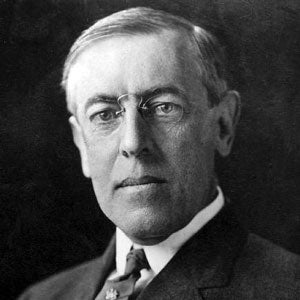Woodrow Wilson
28th president - 1913-1921

Generally numbered among the greater presidents, Woodrow Wilson had the advantage of starting off with a solid Democratic majority in Congress. This allowed him to develop a programme of progressive reform that would command respect even without his better-known activities as a champion of world peace.
The son of a Presbyterian minister, he brought to the presidency an unusual sense of destiny and idealism. He was educated at Princeton and the University of Virginia Law School, earned a doctorate at Johns Hopkins University, then advanced rapidly to become professor of political science and (in 1902) president of Princeton. His reputation as a political thinker caught the attention of conservatives in the Democratic Party, who persuaded him to run for governor of New Jersey in 1910. He surprised them by endorsing a progressive platform, which he pursued with enough success to secure him a presidential nomination in 1912. He received only 42 per cent of the popular vote but, in a three-way election, won an overwhelming electoral majority. He moved quickly to implement his progressive programme. Initial legislative triumphs included the Underwood Act, which reduced a tariff and provided for a graduated Federal income tax; the Federal Reserve Act, which gave much needed flexibility to the money supply; the Clayton Anti-trust Act, which outlawed various unfair business practices and limited the use of injunctions against trades unions; and the establishment of a Federal Trade Commission. His touch was less sure with foreign policy, with well-intentioned but ill-advised interventions in Mexico, the Dominican Republic and Haiti, but he did avoid getting dragged into the First World War – despite damage to US interests by both sides – and campaigned successfully for re-election in 1916 on the slogan: "He kept us out of the war."
By 1917, US neutrality was no longer tenable, and Wilson asked Congress for a declaration of war on Germany that would "make the world safe for democracy". Thereafter, he pursued the cause of Allied victory with ruthless energy. He also defined US war aims with his famous "14 points" – the last of which called for the establishment of "a general association of nations... affording mutual guarantees of political independence and territorial integrity to great and small states alike".
In fact, Wilson never succeeded in creating the enduring peace he envisaged. The Senate refused to ratify the Treaty of Versailles, while his successor, Warren G Harding, decided that the US should not join the League of Nations. None the less, he won the Nobel Peace Prize for his efforts.
An austere, reserved man (whose handshake was once compared to "a 10-cent pickled mackerel in brown paper"), Wilson was as likely to alienate people with his idealism as to inspire them. But he was not responsible for Prohibition, which was passed by Congress over his veto in 1919. Nor did his idealism extend to such subjects as racial or sexual equality. He considered suffragettes "disgusting creatures" and wrote with seeming admiration for the Ku Klux Klan. During his presidency, racial segregation appeared in the Department of the Treasury and the post office.
In September 1919, he suffered a stroke from which he never entirely recovered, but he refused to even temporarily relinquish his duties. He relied on his wife to decide which matters were important enough to bring to his attention. He did not stand for re-election in 1920, but lived in retirement in Washington until his death in 1924. Virtually blind, he described himself shortly before his death as "a broken piece of machinery".
In his own words
"If you think too much about being re-elected, it is very difficult to be worth re-electing."
"It is not men that interest or disturb me primarily; it is ideas. Ideas live; men die."
In others' words
"A clean, learned, honourable and patriotic man." Warren G Harding
"He thinks he is another Jesus Christ come upon the earth to reform men." Georges Clemenceau, president of France.
Minutiae
He was unable to read until he was nine.
His courtship of his second wife, Edith Galt (a widow), provoked much gossip in the media – and an unfortunate misprint in the Washington Post. The item was supposed to say: "The president spent much of the evening entertaining Mrs Galt." But the letters "tain" were accidentally omitted. Most copies of the offending issue were recalled and pulped.
He was the only president to earn a doctorate, gaining a PhD in political science from Johns Hopkins University in 1886.
In 1914, he officially declared the first Mother's Day – as "a public expression of our love and reverence for the mothers of our country".
Join our commenting forum
Join thought-provoking conversations, follow other Independent readers and see their replies
Comments
Bookmark popover
Removed from bookmarks